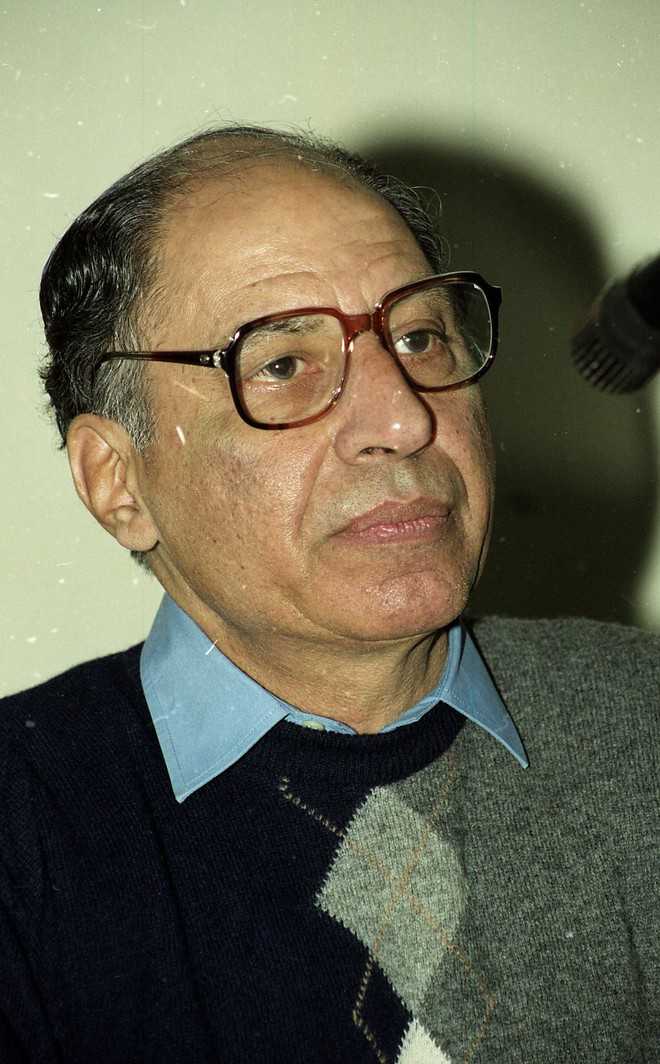
Poetry of pain: As an intellectual and poet, Keki Daruwalla bemoans the fragmentation and divisiveness prevalent in our world
Shelley Walia
“Only political stupidities or atrocities now excite me into writing verse,” admitted Keki Daruwalla in a recent interview. He had returned his Sahitya Akademi Award in 2014 after the death of the scholar MM Kalburgi as a reaction to ultra-rightwing fundamentalism in times when a dire intellectual vacuity was casting a monstrous shadow on our land. The act reminded me of the inhumane stifling of German high culture, literature, music and arts in the wake of the rise of Nazism. As a foremost intellectual and poet, Daruwalla bemoans the fragmentation and divisiveness prevalent in our world, urging the reader to hearken back to the invaluable lessons of history, mysticism, a unified human community dwelling on the incredible beauty and vastness of Nature.
In the face of the relentless assault on human thought, it is vital that art survives this punishing onslaught, and retains its integrity. “I talk about the partiality against one or two communities in our country and the mindset of the fringe on the right,” Daruwalla argues, emphasising his anger at the unescapable violence around him. While the collection is underpinned by the themes of mortality, myth and marginalisation, aptly set forth in the title from Omar Khayyam’s famous lines, Daruwalla presents the sombre subjects of temporality, violence, the dark winters and the hope of new growth, with consummate artistry and a wide sweep from the great myths of Tiresias to the current situation in Iraq to the profound ordinariness of Naropa who heard the ‘bird calls and calls of the heart,’ but never ‘the soul’s call’ and quietly acquiesces to take the ‘goat track to solitude’ when the husband deserts her to engage in the grand explorations of ‘mediation,/trance, dharma, penance:/dangerous words all”.
Daruwalla’s poems have a way of penetrating the fabric of the mind through the objective correlatives that he discovers in the intense treachery and radiance of the landscapes that he inhabits. The sense of site, the rootedness and mythology, both dominate as the central persona in his work. His intuitive understanding blends with the rational to transfer his thoughts to the objects taking the reader closer to a sense of reality. This he achieves unselfconsciously, not allowing the burden of tradition or canon to intrude into his theory of poetry. Daruwalla, in his own words, is “not always looking for effect” but trying to scrupulously respond to a devastated world of moral and physical decay.
Though there is no single theme underlying this collection, Daruwalla retains his inherent sense of history and mythical imagination, writing of Orpheus and Persephone, Rameses and Isis, Queen Hathshepsur and the King of Punt, Gandhi and the world of Pasternak’s Russia where “the wolves are not baying at the winter of the Revolution” but at “candle-lit house of love.” Daruwalla’s range of reference has no borders. His themes are expansive, myth and history are juxtaposed with the conflict and tragedy of the present and the past, a characteristic intrinsic to his modernism, a technique of going back to the literary and political history that juxtaposes antiquity with contemporaneity, suggesting a life in the past richer and yet similar to the modern world of decadence and decay.
The archetypes of violence, sterility and decline are all pervasive in his poem, The Ibis-god ... “whose other name is Thoth, the god of writing, wisdom and magic, but who has now become a god of death signifying the demise of creativity and the end of humanities and arts in the contemporary neo-liberal world: “And where was learning more needed /than near the fault-lines of the underworld?” With the plunge of civilisation into blood and darkness, the poet survives through his imagination, an act that is his only hope in face of despair and the nightmare of history. The myths for Daruwalla symbolise spiritual health. They deepen and universalise experience providing the vocabulary of despair, space and time.
Daruwalla’s preoccupation with birds continues in this anthology; they are fundamental to the natural world that he has always loved to explore and celebrate. It is in his kinship with the falcon, the kingfisher, the owl or the blue jay that he expresses his sense of the formidable as well as the more sombre element in human nature and its perfection. The birds return here both as rapacious and despondent, often representing a longing for freedom and the return of poetic inspiration. Though in ‘Tiresias to Creon” we hear the “clamour of birds” at the “omen-alter” and “much screeching and anger in them” evident in their “beak and talon” that was “clear even to the eyeless, even to Tiresias” Daruwalla visualises, “Divination descend from the gods on high/ through the skies to the birds in the sky/ till it passes on to unfortunates like me.” Like the flight of the falcon, Daruwalla asserts that “there’s nothing like free verse.”
The collection of these powerful poems, so fierce and ironical, solemn and tender, is underscored in the last lines of his short poem, Footnote, where Daruwalla sees the “dark wall of night descend on day”, where “Under the celebration / the footnote of sorrow” subterraneously throws its dark shadow. And yet “you were so much in love with light/ you couldn’t hear a shadow knock.” However, an overpowering sense of hope survives in the vibrant flow of the river, the spring in nature and the flutter of the birds: “No matter how many sandbags enclose/ nervous machine guns/ no matter fire engine clangs/ and the ambulance screams/ dates will sprout and cluster around palm trees/ and the kingfisher dressed in lapis lazuli/ will float and flutter/ over the Tigris/ and his warped image will struggle/ and shiver in the water.” This is modernism at its spirited exhilaration and virtuosity.



























